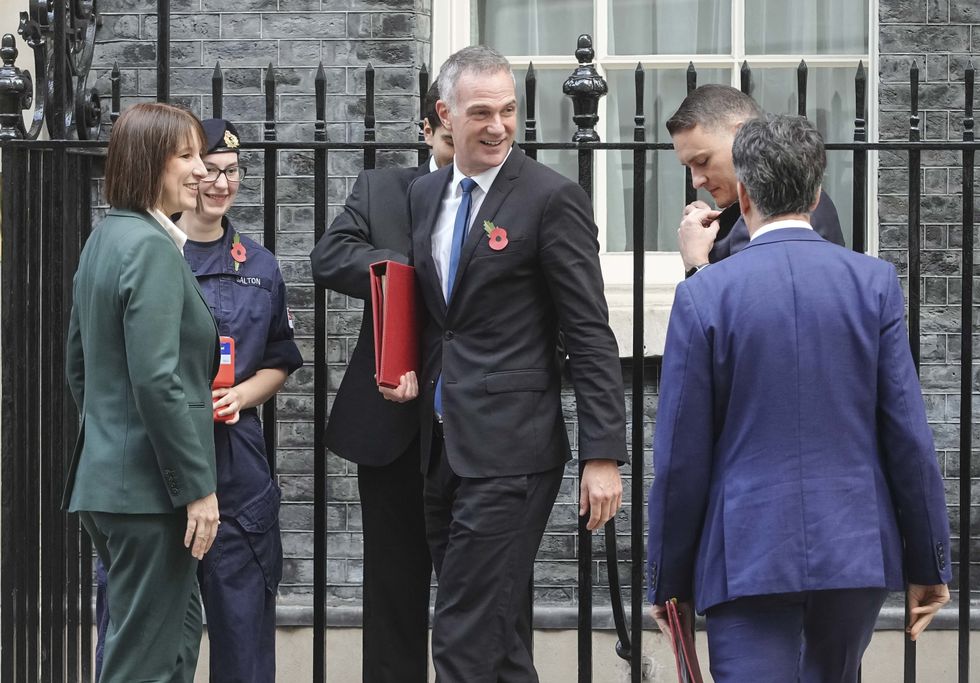Susanna Siddell
Guest Reporter
Rachel Reeves looks set to raise National Insurance for employers in her maiden Budget next week, a report has claimed.
In the Chancellor's attempt to provide more funding for public services and roll out fresh pay rises, Reeves will likely hike employers' contribution by up to two per cent.
Reeves is also predicted to cut earnings thresholds at the point at which businesses face taxation for National Insurance, The Times has claimed.
Such a move is estimated to bring in approximately £20billion to the Treasury and is said to represent the largest tax rise that will be unveiled next week.

However, the tax will only be inflicted on the private sector, as public sector employers - such as the NHS and civil service - will be reimbursed by the Exchequer.
Employers currently pay a rate of 13.8 per cent, which could be brought up to over 15 per cent under Reeves' plan to plug a £22billion "black hole" supposedly left by the last Tory Government.
The Labour Chancellor is expected endure backlash over broken manifesto promises as a consequences after Keir Starmer 2024 pledged not raise income tax, National Insurance or VAT for "working people" ahead of the 2024 General Election.
Throughout the campaign, senior Labour figures assured the public that the term "working people" referred to anyone who went out to work.
Since then, the Prime Minister has said that people who "get their money from going out to work" will be protected by the dreaded tax raid, which has sparked worry amongst those with properties and other assets, such as landlords.
However, Reeves is set to insist that her Budget is not a breach of the pledge since the tax will not directly impact the "working people" - the employees.
LATEST BUDGET NEWS:
She will seek to justify her actions by arguing that the NHS requires greater investment and that businesses must cover the costs.
Reeves is also set to cushion the health service with a further £10billion, raising its budget by approximately three to four per cent, while other taxes, such as capital gains tax on shares, will increase and inheritance tax loopholes will be closed.
Ahead of Reeves' announcement, business bosses have expressed concerns surrounding the tax raid, fearing it would negatively impact the growth that Labour has preached about since their election campaign earlier this summer.
They warned that it could lead to a wage growth slump as employers scramble to combat company expenses.
Big and small businesses alike have openly shared their concerns on growth.
The CBI's interim head of tax policy Andy Scott said: “Many of our members are very concerned about potential increases to employers’ national insurance contributions."
“Firms have told us that increasing employers’ levies will impact their growth plans with potential implications on pay, hiring and investment.”

Tina McKenzie, policy chair at the Federation of Small Businesses, also argued that the Chancellor should not "make it harder for small firms to employ people."
She added: "Small employers need to be paying less tax, not more, on jobs."
A Government source told The Times: "There is a universal consensus that the NHS needs more money. That means asking businesses to help out. The choice is investment versus decline.
"She [Reeves] is choosing not to ask working people to pay the price for their [the Conservatives’] failures."
Starmer has insisted that the Chancellor's Budget will "face up" to the realities of Labour's fiscal inheritance from the Tories.
Lamenting the alleged £22billionn "black hole" in the public finances, the Prime Minister has asserted that he will provide the public with "a sense of how we intend to do business" in the future.
Find Out More...
In the Chancellor's attempt to provide more funding for public services and roll out fresh pay rises, Reeves will likely hike employers' contribution by up to two per cent.
Reeves is also predicted to cut earnings thresholds at the point at which businesses face taxation for National Insurance, The Times has claimed.
Such a move is estimated to bring in approximately £20billion to the Treasury and is said to represent the largest tax rise that will be unveiled next week.

However, the tax will only be inflicted on the private sector, as public sector employers - such as the NHS and civil service - will be reimbursed by the Exchequer.
Employers currently pay a rate of 13.8 per cent, which could be brought up to over 15 per cent under Reeves' plan to plug a £22billion "black hole" supposedly left by the last Tory Government.
The Labour Chancellor is expected endure backlash over broken manifesto promises as a consequences after Keir Starmer 2024 pledged not raise income tax, National Insurance or VAT for "working people" ahead of the 2024 General Election.
Throughout the campaign, senior Labour figures assured the public that the term "working people" referred to anyone who went out to work.
Since then, the Prime Minister has said that people who "get their money from going out to work" will be protected by the dreaded tax raid, which has sparked worry amongst those with properties and other assets, such as landlords.
However, Reeves is set to insist that her Budget is not a breach of the pledge since the tax will not directly impact the "working people" - the employees.
LATEST BUDGET NEWS:
- British drivers face tax hikes ahead of October Budget - Pay-per-mile changes, fuel duty and more
- 'Hiking inheritance tax will trash Reeves' reputation - even amongst her own voters'
- Pension tax raid 'least popular' Labour Budget proposal, bombshell poll finds
She will seek to justify her actions by arguing that the NHS requires greater investment and that businesses must cover the costs.
Reeves is also set to cushion the health service with a further £10billion, raising its budget by approximately three to four per cent, while other taxes, such as capital gains tax on shares, will increase and inheritance tax loopholes will be closed.
Ahead of Reeves' announcement, business bosses have expressed concerns surrounding the tax raid, fearing it would negatively impact the growth that Labour has preached about since their election campaign earlier this summer.
They warned that it could lead to a wage growth slump as employers scramble to combat company expenses.
Big and small businesses alike have openly shared their concerns on growth.
The CBI's interim head of tax policy Andy Scott said: “Many of our members are very concerned about potential increases to employers’ national insurance contributions."
“Firms have told us that increasing employers’ levies will impact their growth plans with potential implications on pay, hiring and investment.”

Tina McKenzie, policy chair at the Federation of Small Businesses, also argued that the Chancellor should not "make it harder for small firms to employ people."
She added: "Small employers need to be paying less tax, not more, on jobs."
A Government source told The Times: "There is a universal consensus that the NHS needs more money. That means asking businesses to help out. The choice is investment versus decline.
"She [Reeves] is choosing not to ask working people to pay the price for their [the Conservatives’] failures."
Starmer has insisted that the Chancellor's Budget will "face up" to the realities of Labour's fiscal inheritance from the Tories.
Lamenting the alleged £22billionn "black hole" in the public finances, the Prime Minister has asserted that he will provide the public with "a sense of how we intend to do business" in the future.
Find Out More...